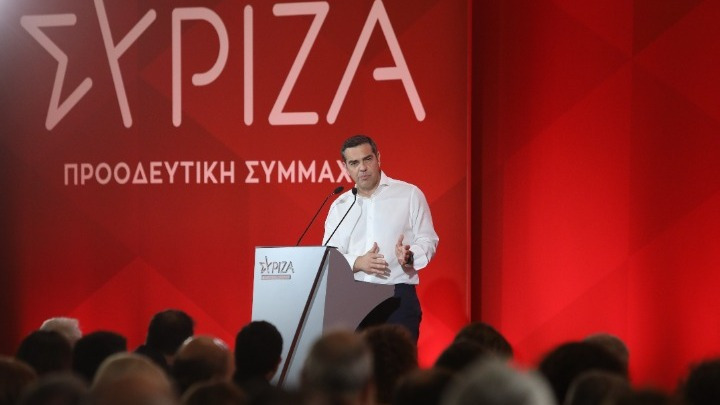SYRIZA-Progressive Alliance leader Alexis Tsipras spoke about his party’s poor performance in the May 21 national elections and what should come next in an address at the Central Committee assembly on Thursday evening in a central Athens hotel.
After three difficult days of reflection, he noted, “the time has come to declare an end to mourning and to sound the battle alert,” urging his party to “regroup immediately, without any delay,” and to “fight the new electoral battle” in the June 25 runoff ballot.
However, he did point out that the party should look into the reasons why its message was not understood as intended.
According to the exit polls, said Tsipras, an estimated 20% of voters made a voting decision in the final hours before and on the actual day: of those 1,206,000 voters (the 20%), he added, 618,000 chose New Democracy and only 156,000 voted for Syriza.
Instead of voting against the government in indignation, he said, they did quite the opposite, “in fear of the main opposition party [returning to power].”
It is “our obligation and responsibility to quickly assess our mistakes, and draw a fresh line,” Tsipras added, as society “is facing the dangerous and unprecedented rise of conservatism.”
Tsipras then referred to what he called the three reasons for Syriza’s electoral performance.
The first reason is that New Democracy “managed to impose its agenda of fear-mongering,” by promoting the idea that change could be dangerous and things could get worse if change indeed came along,” and using Syriza’s mistakes to achieving this, Tsipras added. New Democracy’s media and news outlets superiority was also crucial, also feeding on other opposition parties that took a stance against Syriza.
The second reason, said Tsipras was that Syriza was forced to defend the strategy of simple proportional system for elections it had passed as government, and its goal of a government of progressive cooperation. But, the election result was a strategic defeat of the simple proportionality system, he added, “and at the same time a defeat of our own strategy for simple proportionality.” Tsipras called this “the strategic crack” through which the government’s narrative of loss of stability dominated, as progressive forces continuously turned down a coalition government.
In the critical days before the ballot box, Tsipras said of the third reason, the party presented an image “that did not radiate cohesion, responsibility, or a sense of organization.”
In the run up to the May 21 elections, he added, positions expressed publicly during campaigning “seemed to miss their target,” while “the backbiting, the lack of responsibility, even understanding how suspicious the electorate was towards us, how fluid and changeable, cost us dearly,” he stressed.
We ought to “change that image, we ought to change – period,” he underlined, and the party’s new pre-electoral campaign should take all this into account.
In this new situation therefore, he said, the “party’s fighting front should be the Right’s economic and social policies,” dismissing “all petty political micro-civil wars.”
Syriza’s new election campaign will take all this into account, he stressed, “to show change, renewal, that we have received the message, and are actually correcting our failures and mistakes.”
Tsipras’ was the only speech at Central Committee assembly. According to party sources, anybody who wanted to submit an opinion they could do so in writing.
SOURCE; ANA-MPA







